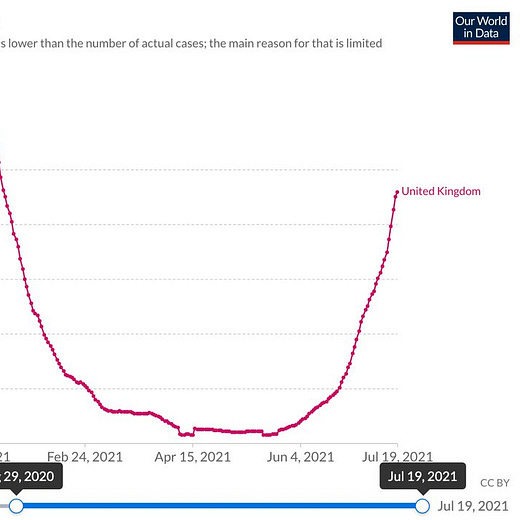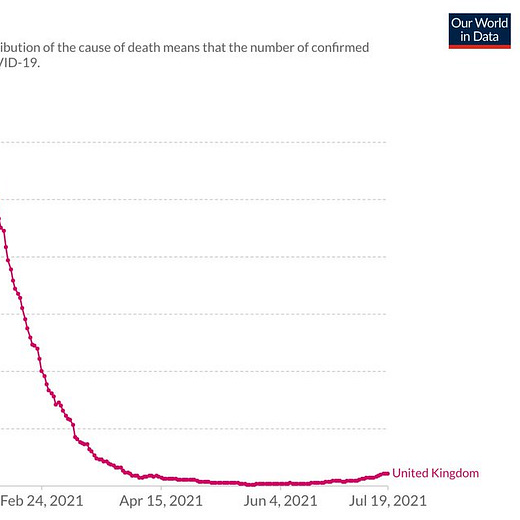The Mandates Cometh
And Nancy Pelosi humiliates Kevin McCarthy.

Hey everyone. The Jackal is Backal. This week we are focused on:
The way to tackle vaccine hesitancy.
House Speaker Nancy Pelosi completely outmaneuvering Kevin McCarthy on the House Committee investigation into January 6th.
I picked these two stories because I think they are sort of linked in a weird way. Both issues sort of show the limits of the GOP’s constant culture war against Democrats, where “owning the libs” sounds like a great idea while it’s happening, but then reality hits and it produces no actual results.
Take the January 6th Committee, for instance. After Republicans in the House and Senate killed the January 6th Commission - distinct from the Committee, as it would have been bipartisan and given the Republicans the ability to veto certain proposals - Pelosi announced that the House would name their own Select Committee to investigate what happened that day.
She named her Democratic selections to that Committee and then somewhat surprisingly used one of her eight picks to select Republican Liz Cheney, getting out ahead of McCarthy before he announced his picks. McCarthy then waited until about two weeks before the Committee began its work name the Republican members:
Jim Jordan
Jim Banks
Rodney Davis
Kelly Armstrong
Troy Nehls
People immediately assumed McCarthy was trolling. Jordan himself was a potential witness in the investigation, since he met with Trump on December 21, 2020, to discuss trying to overturn the election results on January 6th. Banks had been almost as pro-Trumpy as Jordan, but he got especially silly when he said he would use the Committee to investigate what the Biden Administration had to do with the Capitol invasion (there was no Biden Administration on January 6th). Banks also reportedly traveled to the border with a participant in the Insurrection, so there’s that. Long story short, they were the two most Trumpy and (therefore) unserious people on the panel, so they were rejected.
McCarthy obviously expected them to be rejected, which is why he named them to the Committee in the first place. His ultimate goal is to cast the Committee as overtly partisan so that the GOP can use that angle to attack its findings when they come up bad for Trump and House Republicans. A pretty obvious tell: As soon as Pelosi rejected Banks and Jordan, McCarthy pulled the other three members, barring them from participating. McCarthy’s temper tantrum notwithstanding, it really looks like Pelosi outsmarted him at every step. His statement about the whole thing sort of highlights his clumsiness:
Denying the voices of members who have served in the military and law enforcement, as well as leaders of standing committees, has made it undeniable that this panel has lost all legitimacy and credibility and shows the Speaker is more interested in playing politics than seeking the truth.
The problem with that statement? Neither Banks nor Jordan served in the military. That would be Troy Nehls, whose appointment Pelosi did not reject. So, in this case, the person “denying” Nehls’s voice would be Kevin McCarthy himself.
Also related to Nehls: Pelosi did not make the votes members took on certifying the election results a pre-condition for their dismissal. So, even though Nehls did not vote to certify Biden’s win, Pelosi allowed him to stay on the Committee anyway, robbing McCarthy of another potential argument.
Now, McCarthy is watching his blatant political play blow up in his face. On Sunday, Pelosi asked Republican Adam Kinzinger to be on the Committee (who accepted), and she hinted she’d be asking for more. I don’t think she’ll fill all five GOP seats, but she could ultimately end up with three Republicans on her Committee, which is not too shabby. There are also rumors former GOP congressman Denver Riggleman is going to serve as an outside counsel to the Committee, which helps juice the numbers.
The fundamental problem here is that McCarthy and D.C. Republicans live in this fantasy world where they think they can ride the lightning. We’ve touched on this many times before, but McCarthy was for a January 6th Commission before he was against it. And by “against it,” I mean he saw how much money Donald Trump’s everlasting #stopthesteal campaign could bring into the GOP and flew down to Florida to grovel at Habsburg’s feet. There was a brief moment of about two weeks in January where the GOP really looked like they were going to move on from Donald Trump, and then Republican leadership threw that moment into a black hole.
McCarthy’s current political strategy is to keep Donald Trump happy, and keeping him happy means essentially endorsing #stopthesteal and retconning January 6th into just a patriotic uprising that got a little out of hand (as some of his members are doing). And this is where McCarthy is always going to run into trouble: He truly believed that if he tried to poison the well, the rest of the country would just ignore the Committee and its investigation into January 6th. Being a conservative nowadays means holding lots of competing ideas simultaneously, but try to follow this apparent line of thought:
The mainstream media is controlled by liberal elites and they are all hopelessly and shamefully biased against Republicans.
Because Pelosi rejected Jordan and Banks, McCarthy can now deem the Committee to be partisan and the media will agree with him and frame it that way.
When I try to square this reasoning my face does this 🥴. It sounds nuts, but it’s apparently called “strategy” on the Right. The Committee is moving forward, it’s going to turn up bad things about Trump, and it will be literally bipartisan. If you don’t think the media isn’t going to celebrate its findings and hail Cheney, Kinzinger, and maybe say, Peter Meijer, as “truly principled conservatives” who “bucked their Party,” I have another amazing real estate opportunity for you in Brooklyn. The D.C. media loves to write that story and they will.
The country’s vaccine stagnation is somewhat related to the nutty maneuvering by McCarthy. You see, the reason Trump was so effective with the GOP base is because he understood that they didn’t actually care about lower taxes, a free-market economy, or any sort of coherent foreign policy. What they have really wanted for years is a culture war that they can feel like they’re winning. One of the best interviews Trump ever did was with Larry King in 1991 after David Duke’s loss in Louisiana. The interview shows that Trump really did understand the politics of the GOP base from an early stage, as he notes that Duke (who captured 55% of the white vote in Louisiana) was an “anger vote” and that Duke understood those voters. He even speculates that Pat Buchanan, “who really has many of the same theories except it’s in a better package,” could pose a problem for George H.W. Bush in 1992.
As Adam Serwer notes in his book, “The Cruelty is the Point,” this interview shows that Trump understood that white grievance motivated a huge chunk of the GOP base as far back as Bush I. Fast forward through Trump watching Fox News non-stop from 2008-2015, and you find that as he gets ready to enter the primaries in the 2016 election, he has done meticulous research into what the GOP actually wants to told. For decades, that portion of the base has had to hear, “OK, but you’re wrong,” from the GOP leadership that wanted their votes, but also wanted to tell them the truth (Obama was not a Muslim, for instance). Trump had found his angle: No one could lie to the GOP base like he could, and for that, they would love him.
Part of this is also linked to a conservative media apparatus that similarly understands its audience. Tucker Carlson, for instance, has one-thousand percent been vaccinated (I know healthcare workers who were there when he got his vaccine), but he knows how to read polls, and the GOP base was telling pollsters in October of 2020 that they weren’t taking the vaccine. “Screw science, because that is elite liberal bullshit.”
Opposition to the vaccine has now become political to the GOP base. At one of the recent CPAC events (there’s now more than one?), when the human toilet seat Alex Berenson noted that the Biden Administration would not reach herd immunity, the crowd cheered.
Reporting from Politico finds similar sentiments in the South:
“To say that politics doesn’t play a part would be wrong,” Melton said. “I think the national figures get people talking about the vaccine and that can sometimes take the wrong fork in the road and go the wrong way.” […] “I have people come up to me and say, ‘Why on CNN? Couldn’t you go on Fox?’ They are still very angry over the last couple of years. There’s an irritation. They are super frustrated. They need to hear it from the people that they trust. They need to hear it from where they get their news every day.”
With the Delta variant rising and causing an infection and hospitalization spike in the more Republican parts of the country, GOP leaders are now trying to hop off the lightning. But it’s almost impossible; last week, people pointed to Sean Hannity’s “reversal” on vaccines, as he seemingly encouraged his audience to get vaccinated:
Hannity reversed course the following day:
The GOP is wrapped up in the culture war that Trump used to win the base in 2015 and excite the base enough to get him a win in 2016. The benefits of waging that war certainly have their limits, and Donald Trump himself is unpredictable. He has shown that he has no desire to back down from his position that the election was stolen. Now, I think Trump is mentally ill, which means he deserves all the protections of political correctness that we afford others, but I do not believe Kevin McCarthy is ill. I don’t think Mitch McConnell is either. Yet both have retreated into a, “Don’t ask, don’t tell,” position on Trump’s fraud campaign. It works great for fundraising, but it’s impossible to control. I think McConnell is smart enough to know this and I think McCarthy exists, so it’s not clear why the former is speaking out more forcefully against The Big Lie.
Eventually, the GOP is going to find themselves feeling (both re: 1/6 and the vaccines) a lot like Donald Trump on election night in 2016: Ghost white, terrified that he’d actually won, and with no idea of what to do next.
Some should-reads: On COVID vaccines mandates, read David Frum and Michael Cohen (not that Michael Cohen). I think mandates are basically inevitable, and it’s because of pieces like this: Basically, Leonhardt argues that there really are groups of people who can be persuaded to get the vaccine. If you do give them a little nudge or make life a little more difficult for them, they can be twisted into getting the jab. Others, like the Trump fans noted above, are never going to be persuaded, so we can’t cater to them. Bring on the mandates and let’s save some people.
While you’re at it, read Frum on Trumpism too.
And read this incredible piece on Emmett Till (lots of Atlantic links).
Finally, related to our discussions on Critical Race Theory, NY Mag has a great and fair criticism of Ibram X. Kendi.
They’re still ironing out the details, but the Biden Administration’s ability to push through the infrastructure bill is a pretty big deal. An even bigger deal: Mitch McConnell has supposedly conceded that he can’t stop it from passing. Obviously, the full version has to pass both the House and the Senate, but it is incredibly significant that there is going to be some sort of major infrastructure package coming out of Washington, even if it’s not the full, $ 3.5 Trillion (!) package (which might actually happen [!]).
See all of you next week. August, like July, will also have a slightly more relaxed schedule.








